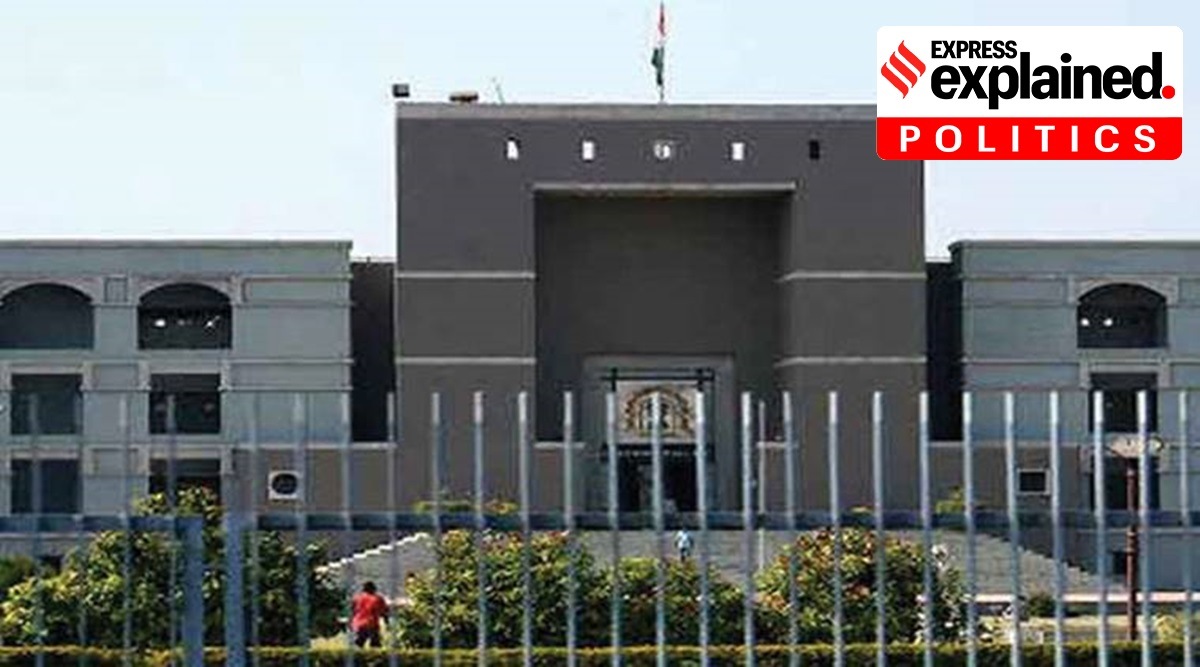 The Gujarat High Court (Express Photo/File)
The Gujarat High Court (Express Photo/File) As early as 2009, when the Congress-led UPA was in power at the Centre, the Gujarat High Court ruled on a PIL stating that the appointment of Independent Directors on the boards of Public Sector banks was not done on merit but to favour politicians connected with the Congress and its allies.
Dismissing the concern, the court stated: “Primary consideration of the Government should be the interest of public sector banks, its depositors and not interest of the nominees or any other vested interest. We are sure that the Government will give serious thought in future so unnecessary criticism could be avoided.”
The petition was based on an investigation by The Indian Express in May 2007 that the then Government headed by Manmohan Singh appointed 37 Independent Directors on the boards of Public Sector Banks of whom at least 33 had ties to the Congress. These included five AICC secretaries, a vice-president and a secretary of the All India Mahila Congress and the Seva Dal.
Since that court order, however, several red flags have been raised at various levels on the politics of appointing Independent Directors.
In 2017, a Government-mandated committee under Uday Kotak submitted a report, which stated that there needs to be a continuous assessment of the independence criteria when it comes to Independent Directors. It said that this evaluation of ‘independence’ should entail both objective and subjective assessments.
In 2018, the Parliamentary Standing Committee on Industry headed by R C P Singh recommended that “a scrupulous mechanism for performance evaluation of Independent Directors has to be brought in with urgent priority”. The committee also recommended that the Department of Public Enterprises “shall initiate an exercise to contemporarily recast the eligibility conditions for Independent Directors”.
In 2019, a research report on “Discipline of Independent Directors: From Code to Contribution” by Indian Institute of Corporate Affairs (IICA) noted: “The selection of Independent Directors for PSUs have not remained independent. Instead of experienced domain experts, preference is being given to ex-IAS or recently to political affinity so the whole idea of ID has been vitiated.”
And, just over two months ago, while addressing a conference on Corporate Governance in Mumbai on April 6, SEBI chief Ajay Tyagi said: “I must admit that notwithstanding various efforts, we are yet to get ideal solutions to issues such as ensuring the independence of independent directors, selecting the best-suited persons as independent directors and making their role more effective and meaningful.”
Independent Directors are non-official directors who do not have any relationship with the companies, where they have been appointed, which may affect the independence of their judgment. Their job is to act as objective watchdogs and includes improving governance standards and corporate credibility.
The Companies Act 2013 states: “Every listed public company shall have at least one-third of the total number of directors as Independent Directors and the Central Government may prescribe the minimum number of Independent Directors in case of any class or classes of public companies.” Independent Directors are not involved in the daily functioning of companies but in policy making and planning.
According to the Act, Independent Directors “may be selected from a data bank containing names, addresses and qualifications of persons who are eligible and willing to act as independent directors, maintained by any body, institute or association, as may be, notified by the Central Government.” It states that the responsibility “of exercising due diligence before selecting a person from the data bank” lies with the company.
In PSUs, the names are recommended by a search committee comprising three Secretary-level officials and two non-official members. They are appointed by the administrative ministry after approval is obtained from the Appointments Committee of the Cabinet (ACC). Finally, the names have to be approved by the respective PSU boards.
Usually, the tenure is for three years. They are “not be entitled to any stock option” but “may receive remuneration by way of fee” and “reimbursement of expenses for participation in the board and other meetings and profit-related commission as may be approved by the members”. During 2019-20, the sitting fee at ONGC and Power Finance Corporation for board meetings was Rs 40,000 and for committee meetings Rs 30,000.
This article first appeared in the print edition on June 29, 2021 under the title ‘When UPA did the same, Gujarat HC said: Hope Govt will give serious thought ahead’.
- The Indian Express website has been rated GREEN for its credibility and trustworthiness by Newsguard, a global service that rates news sources for their journalistic standards.

